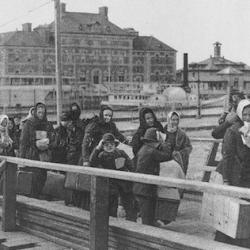Trump is an executive, used to making twenty-five major decisions a day. Now the press is watching every motion of his hand, and it looks as if he’s overturning the world as we have known it with each stroke of his pen. Tallying up pluses and minuses is a full-time job and not in my porfolio. I offer a few gleanings about his executive order on immigration, mostly from those wiser than I.
Trump says that the travel restriction is about the war on ISIS and terrorism generally. There are some holes in that claim, especially when we consider that the most destructive terrorists in the US originated from Saudi Arabia and Egypt, neither of which made the list. Saudi Arabia has long been an exporter of Islamicist ideology. There’s room for cynical skepticism about who is counted as an enemy, but let’s take Trump’s explanation at face value. What effect will the restriction have on the war on ISIS and its imitators?
In itself, probably not much. But David Goldman thinks that we’re missing the point if we focus on the direct effects of the ban: “Many Muslim governments, institutions, and individuals do not actively support terrorism, but tolerate it. Active terrorists are a small minority, but they swim in a sea of broader Muslim opinion that sympathizes with terrorists like Hamas in Gaza or Hezbollah in Lebanon. The last time the Pew Institute surveyed Muslim opinion about Hezbollah and Hamas (in 2010), it found majorities or very large minorities in support of these terrorists in most of the largest Muslim countries.” Remember where Osama bin Ladin’s compound was, and you have a glaring illustration of the problem.
Bush and Obama tried to massage the situation, trying to cajole radical groups to moderate. Trump is trying something else: Shifting the burden of screening toward Muslim countries that turn a blind eye: Trump intended to “serve notice on Muslim governments: If they don’t crack down on terrorists and their supporters, we won’t let their citizens into the United States until we find ways to vet entrants ourselves. The terrorists have been winning the intelligence war because a very large number of Muslims fear the terrorists more than they do the counterterrorism efforts of the United States and other Western governments. The terrorists infest Muslim communities and operate like a gangland protection racket. It is dangerous to stand up to them. This will change when Muslims fear the U.S. government more than they fear the terrorists.” Trump is trying to shift the balance in the Muslim world itself, pressuring governments in (some) majority Muslim nations to pressure their citizens. No one knows if this will actually have any effect.
The Syrian refugee ban undermines one avenue of resistance to terrorism. Dan McLaughlin’s National Review Online piece provides a good starting point for a rational national conversation on the whole topic. (I spent a painful hour watching Tucker Carlson demonstrate how not to carry on a rational national conversation; Carlson was too eager to score crowd-pleasing “gotchas” to care what his interviewees had to say.) McLaughlin points out that refugees have often been “deployed directly against hostile foreign tyrannies. Today, for example, the chief adversary of Venezuela’s oppressive economic policies is a website run by a man who works at a Home Depot in Alabama, having been granted political asylum here in 2005.” Syrian refugees could be very effective in the war against ISIS.
Another effect, much noted, is to favor Christian refugees from the Middle East. McLaughlin notes the Obama administration’s policy of discrimination against Christian refugees, quoting a Newsweek story from September 2016 in support:
“The United States has accepted 10,801 Syrian refugees, of whom 56 are Christian. Not 56 percent; 56 total, out of 10,801. That is to say, one-half of 1 percent. The BBC says that 10 percent of all Syrians are Christian, which would mean 2.2 million Christians. . . . Experts say [one] reason for the lack of Christians in the makeup of the refugees is the makeup of the camps. Christians in the main United Nations refugee camp in Jordan are subject to persecution, they say, and so flee the camps, meaning they are not included in the refugees referred to the U.S. by the U.N. ‘The Christians don’t reside in those camps because it is too dangerous,’ [Nina Shea, director of the Hudson Institute’s Center for Religious Freedom] said. ‘They are preyed upon by other residents from the Sunni community, and there is infiltration by ISIS and criminal gangs.’ ‘They are raped, abducted into slavery and they are abducted for ransom. It is extremely dangerous; there is not a single Christian in the Jordanian camps for Syrian refugees,’ Shea said.”
McLaughlin adds that “2016 was the first time in a decade when the United States let in more Muslim than Christian refugees, 38,901 overall, 75 percent of them from Syria, Somalia, and Iraq, all countries on Trump’s list – and all countries in which the United States has been actively engaged in drone strikes or ground combat over the past year.”
As a matter of fairness, Trump’s decision to favor Christian refugees should be applauded. For Christians, it is more than fairness: These refugees are brothers and sisters fleeing persecution for their faith. Whatever else we may say about him, Trump’s favor to Christian refugees is a big plus. Trump adviser Stephen Miller has explained that the purpose of the ban is to prevent the US from accommodating to terrorists, as, in the administration’s view, Europe has. (The differences between Europe and the US need to be taken into account here. We have, it seems, a better track record of making Americans out of Muslims.) It’s a dizzying thought: Trump as defender of Christendom. Though perhaps not any more dizzying than Charlemagne as defender of Christendom.
Here, as always, things are complicated. Christianity Today reports that Middle Eastern Christians are fearful that the open policy to Christian refugees will speed the process of deChristianization by robbing Middle Eastern churches of people and their gifts.
Anti-Trump protesters are amnesiac if they think this is the first time we’ve restricted immigration or debated what immigrants we should favor. If immigrants are as American as apple pie, so is debate about which and how many to welcome.
Still, the liberal protesters are right about this much: America’s welcome to immigrants is one of the glories of our history. It is part of our heritage as a distinctively biblical country. Through private religious organizations as well as through government programs, we’ve made good on Emma Lazarus’s sentiments. Americans have honored the Scriptural standard, that our nation will be judged by how we treat the weak and helpless. It would be more than an American tragedy if we retreated from that great heritage. It would be a tragedy for the church’s witness in the world.
Trump’s executive order does not in itself represent such a retreat. The travel bans are temporary, and we are still receiving refugees from other countries. Besides, we are not prevented from helping Syrian refugees in other ways. Christianity Today has published several articles explaining how Christians can and should continue to support refugees within the limits of Trump’s order.
Still, as a form of nationalism, Trumpism flirts with idolatry, and that could erode the American generosity to the dregs of the world. Stanley Hauerwas, his ear ever attuned to false gospels, heard more than flirtation in Trump’s inaugural address. Trump stated, “At the bedrock of our politics will be a total allegiance to the United States of America and through our loyalty to our country we will recover loyalty to each other.” As Hauerwas says, this “is clearly a theological claim that offers a kind of salvation.” “Total allegiance” is owed to no one but God. “Otherwise we run the risk, as Trump exemplifies, of making an idol out of some human enterprise.”
Trump’s immigration pause includes a creed of sorts. Potential migrants would be screened to determine whether they support American values. Among them: “the United States should not admit those who engage in acts of bigotry or hatred (including ‘honor’ killings, other forms of violence against women, or the persecution of those who practice religions different from their own) or those who would oppress Americans of any race, gender, or sexual orientation.”
This is a clever gambit from the Trump administration: Those accusing them of bigotry for pausing immigration and the refugee program can be told they are actually trying to prevent bigots from entering the country. But one wonders whether Christian refugees will be able to pass the test, or if their traditional views of male-female relations or their rejection of homosexuality and gay marriage will disqualify them. The order seems to reflect Obama’s Seneca Falls to Selma to Stonewall narrative of triumphant American rights. And then it’s not clear how far Trump intends to challenge the advance and entrenchment of liberal order. The executive order imposes a religious test of sorts, but not the one that everyone is objecting to; it’s a test of immigrants’ adherence to the creed of Americanism.
One of the most important contributions Christians can make to this or any other public debate is calm. There are reasonable legal and moral arguments on the different sides of this complicated debate. But in the nature of the case, decisions and opinions are easily driven by anxiety. Policies can be formulated and promulgated in fear; protests can be organized in fear; shouting media heads can spread fear in every direction: We should neither be overcome by fear, nor spread it.
Our Lord told us not to fear, and we have nothing to fear, since everything, even this, is in our Father’s hands.











